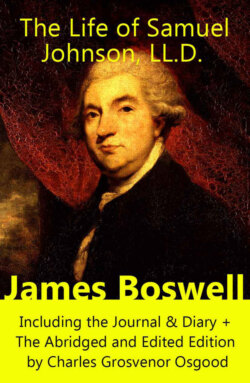Читать книгу The Life of Samuel Johnson, LL.D. - James Boswell - Страница 145
На сайте Литреса книга снята с продажи.
‘SAM. JOHNSON.’
Оглавление‘July 20, 1762.’
This year his friend Sir Joshua Reynolds paid a visit of some weeks to his native country, Devonshire, in which he was accompanied by Johnson, who was much pleased with this jaunt, and declared he had derived from it a great accession of new ideas[1113]. He was entertained at the seats of several noblemen and gentlemen in the West of England[1114]; but the greatest part of the time was passed at Plymouth, where the magnificence of the navy, the ship-building and all its circumstances, afforded him a grand subject of contemplation. The Commissioner of the Dock-yard paid him the compliment of ordering the yacht to convey him and his friend to the Eddystone, to which they accordingly sailed. But the weather was so tempestuous that they could not land[1115].
[Page 378: Johnson at Plymouth. A.D. 1762.]
Reynolds and he were at this time the guests of Dr. Mudge[1116], the celebrated surgeon, and now physician of that place, not more distinguished for quickness of parts and variety of knowledge, than loved and esteemed for his amiable manners; and here Johnson formed an acquaintance with Dr. Mudge’s father, that very eminent divine, the Reverend Zachariah Mudge[1117], Prebendary of Exeter, who was idolised in the west, both for his excellence as a preacher and the uniform perfect propriety of his private conduct. He preached a sermon purposely that Johnson might hear him; and we shall see afterwards that Johnson honoured his memory by drawing his character[1118]. While Johnson was at Plymouth, he saw a great many of its inhabitants, and was not sparing of his very entertaining conversation. It was here that he made that frank and truly original confession, that ‘ignorance, pure ignorance,’ was the cause of a wrong definition in his Dictionary of the word pastern [1119], to the no small surprise of the Lady who put the question to him; who having the most profound reverence for his character, so as almost to suppose him endowed with infallibility, expected to hear an explanation (of what, to be sure, seemed strange to a common reader,) drawn from some deep-learned source with which she was unacquainted.
[Page 379: An enemy of the Dockers. Ætat 53.]
Sir Joshua Reynolds, to whom I was obliged for my information concerning this excursion, mentions a very characteristical anecdote of Johnson while at Plymouth. Having observed that in consequence of the Dock-yard a new town[1120] had arisen about two miles off as a rival to the old; and knowing from his sagacity, and just observation of human nature, that it is certain if a man hates at all, he will hate his next neighbour; he concluded that this new and rising town could not but excite the envy and jealousy of the old, in which conjecture he was very soon confirmed; he therefore set himself resolutely on the side of the old town, the established town, in which his lot was cast, considering it as a kind of duty to stand by it. He accordingly entered warmly into its interests, and upon every occasion talked of the dockers, as the inhabitants of the new town were called, as upstarts and aliens. Plymouth is very plentifully supplied with water by a river brought into it from a great distance, which is so abundant that it runs to waste in the town. The Dock, or New-town, being totally destitute of water, petitioned Plymouth that a small portion of the conduit might be permitted to go to them, and this was now under consideration. Johnson, affecting to entertain the passions of the place, was violent in opposition; and, half-laughing at himself for his pretended zeal where he had no concern, exclaimed, ‘No, no! I am against the dockers; I am a Plymouth-man. Rogues! let them die of thirst. They shall not have a drop[1121]!’
[Page 380: Johnson’s third letter to Baretti. A.D. 1762.]
Lord Macartney obligingly favoured me with a copy of the following letter, in his own hand-writing, from the original, which was found, by the present Earl of Bute, among his father’s papers.
‘To THE RIGHT HONOURABLE THE EARL OF BUTE.
